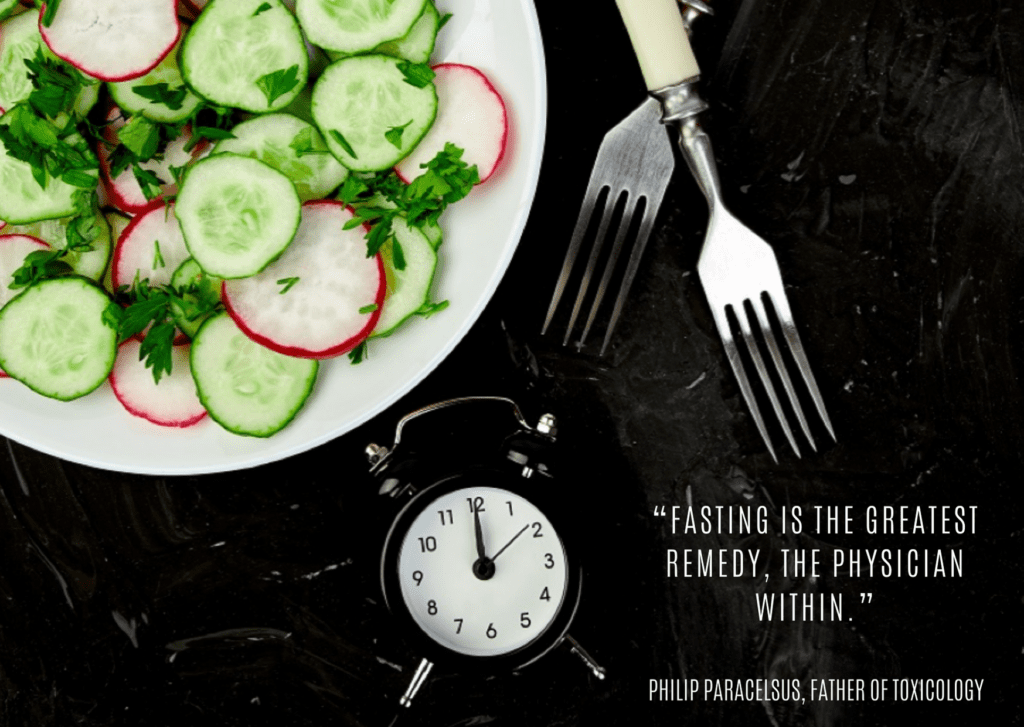The Missing Component in Every Diet: fasting

Going for lengthy periods of time without eating – aka fasting – has become a hot-topic! There are a lot of articles and blogs about fasting making their rounds online, and while many seem to be legitimate, some are filled with myths, biased opinions and pure speculation.
Voluntary fasting (very different from starvation) has been practiced around the world since the beginning of time. Although there are different types of fasting, Intermittent Fasting (IF) has received the most attention lately, for its range of health benefits. Time-Restricted Feeding (TRF) is one of the most popular forms on IF, and simply means that you only eat during a certain period of time – usually lasting around 8 hours or less. This may sound unhealthy or daunting to most since many dietitians have recommended eating small meals every 2-3 hours. Others, however, believe fasting helps to reset your body, boost your metabolism, aid in weight loss, and improve heart health.
There are countless books, articles and blogs that cover all the ‘best diets’, food choices, and maybe include exercise regimes too. However, almost all of them are missing fasting – the key component that can improve your health, regardless of what you eat!
Fasting is a great tool, and it is pretty easy to implement into your lifestyle. Keep on reading to learn more about fasting and how you can start today!

This article covers five key points on intermittent fasting:
- What is intermittent fasting?
- What are the top benefits?
- How does IF work its magic?
- Is not eating really safe?
- Common concerns & questions with IF.
- What is intermittent fasting?
[divider height=”30″ style=”default” line=”default” themecolor=”1″]
1. What is intermittent fasting?
Intermittent fasting is a broad term that refers to dietary approaches in which individuals go extended periods of time (typically 12–48 hours) with little or no caloric intake, with intervening periods of normal intake, on a recurring basis.
Here are some of the most common examples of IF approaches:
Time-restricted feeding (TRF)
This is the most popular form of IF, which involves restricting food intake to specific time periods of the day for typically 8 hours or less. A common version of this is One Meal A Day (OMAD): you eat all of your daily calories in just one meal each day and fast the rest of the day.
Alternate day fasting (ADF)
This involves alternating “fasting” days (no calories) with “feast” days (unrestricted food intake).
Alternate day modified fasting (ADMF)
This variation of ADF restricts calories to about 75% of your baseline needs on “fasting” days (about 500 calories/day), which are alternated with unrestricted “feast” days.
Periodic fasting (PF)
Also referred to as “whole-day fasting,” this consists of 1–2 days of caloric restriction a week, along with ad libitum food consumption (eating until you’re full) the other 5–6 days of the week.
Fasting mimicking diets (FMD)
FMD is designed to mimic the physiological state of fasting and provide many of the benefits without actually fasting. For 5 days a month, you restrict caloric intake to 30-50%, and then eat normally the rest of the month.
2. What are the top benefits of IF?
Multiple studies have investigated the effects of fasting on health outcomes, and a significant amount of health benefits have been found.
Calorie restriction is known to provide many benefits, and to be a key driver for increasing lifespan, losing weight and reducing the risk of metabolic diseases. The great thing about fasting is that it mimics the effects of calorie restriction without you having to be overly strict with limiting food intake day in and day out, allowing you to be more flexible during eating windows. Long term calorie restriction can, in extreme cases, be detrimental to your health by reducing thyroid function, sex hormones, lean body mass and can also lower your metabolism – all of which are very counter intuitive to losing weight and having a resilient and robust body!
Although weight management is a primary benefit, IF is an eating schedule that has multiple payoffs in the long run. Let’s take a look at some of them.
Reduced body weight, fat, & visceral fat – fasting increases fat oxidation rates and fat-burning.
Increased muscle mass – fasting, if done correctly, stimulates the production of Human Growth Hormone (HGH) which promotes the preservation of muscle mass.
Metabolic flexibility – fasting helps to develop the metabolic pathways for burning both fat and carbohydrates, enabling better utilization of the food you eat. More on this below.
Appetite regulation – balancing hunger hormones ghrelin & leptin helps control appetite.
Heart health & longevity – fasting improves blood lipids (triglycerides and cholesterol), blood pressure, insulin sensitivity and blood sugar levels.
Brain health – fasting is neuroprotective as it increases a hormone called BDNF in the brain which helps to grow new neurons, synapses and neural connections, improving memory and learning.
Boost energy levels – it may sound counterintuitive, but fasting gives you more energy, likely due to a rise in adrenalin.
Anti-aging – fasting increases autophagy – a process that clears out old, damaged cells, and is associated with improved longevity – which is like a ‘cellular cleanse’, improving the functioning of your body as a whole.
Improve gut microbiome – fasting improves the diversity of your gut bacteria, which is linked to better weight management and immune function.
Increased ketone levels – fasting stimulates fat oxidation and the production of ketones from fat.
Additional benefits include:
- Reduced resting heart rate & blood pressure
- Increased parasympathetic activity
- Increased heart rate variability (a good thing)
- Reduced inflammation
- Increased insulin & leptin sensitivity
- Increased resistance of the brain & heart to stress
- Circadian rhythm alignment
And, as if you needed another reason to fast, one of the most unrecognized, yet powerful benefit is the restored relationship with food. We are so used to consuming all the time, that we forget to appreciate food and to realize what it is doing for us. Fasting forces you to take a step back and to re-establish the relationship we are meant to have with whole and natural food.
3. How does intermittent fasting work its magic?
Scientists now believe that many of the benefits of IF are the result of flipping the metabolic switch: when you fast and/or eat fats without carbs being present, you switch on fat-burning metabolic pathways, and when you eat carbohydrates, you switch on the carb-burning metabolic pathways. In other words, IF turns off sugar burning and turns on fat burning and therefore ketone production. This makes you more metabolically flexible, meaning you can be ‘dual-fuel’!
Why is being metabolically flexible optimal? Because it means that you can utilize both fat and carbs as an energy source when you eat them. If you’re metabolically inflexible, you’re likely a good carb burner, but lack the ability to burn fat for fuel, leading to fat storage instead.
It is easier to understand this by explaining what happens, physiologically, in your body when you eat:
- Depending on what you eat, your blood glucose will rise – the amount by which your glucose will rise is determined by the type of food you have.
Your pancreas responds by secreting the hormone insulin. - Insulin triggers your cells to take up the glucose from the bloodstream to be used for energy.
- Leptin, and other hormones, then get released that signal that you are full.
When you eat high carb, sugary foods or eat too frequently, you’re continuously causing a rise in blood sugar and stimulating insulin release to get the sugar into the cells. But, the cells eventually reach their full capacity, and any excess sugar gets stored as fat.
This is where fasting comes in! When you give your metabolism a break, your blood sugar levels remain stable, your insulin levels drop, and you allow your body to utilize the energy that it has stored.
On the other hand, then you’re continuously in a fed state, you cannot mobilize the energy you have stored in fat. Your body also cleans out old and damaged cells via the process previously mentioned called autophagy – which is ultimately a cellular cleanse!
4. Is it safe to fast?
Evolutionarily, humans are designed to withstand periods of abstinence. We’re markedly efficient at storing energy, and during periods of prolonged fasting, it’s very clear that we’re wired to flip that metabolic switch. Our ancestors would have gone extended periods of time without food, being forced to utilize the fuel they have on board only, whilst hunting or scavenging for food.
Historically, fasting has been used as both a spiritual and a medical practice for thousands of years. For example, Jesus Christ, Buddha and the prophet Muhammed all practice fasting for extended periods of time – from 40 up to 200 days! Muslims fast from sunrise to sunset during Ramadan. Additionally, the ancient Greeks practiced fasting regularly and believed fasting to be the ultimate treatment of illness. So, instead of searching for the next exotic, miraculous diet, why not look back to ancient traditions that are ingrained in human heritage.
In short—YES, it is safe to fast! In the modern world we live in today, we have simply been wired to believe that it is dangerous to go without food. We get uncomfortable, scared and tend to panic when we don’t know when and what our next meal will be! Ask yourself, would our ancestors have the next day’s, never mind the next weeks’ worth of meals prepared? No. Definitely not!
Hopefully this article allowed you to take a step back and re-evaluate your relationship and perception of food. We live in a world of abundance. Everything, especially food, is readily available to us at all times. So, the next time you decide to hook a left and pull into the Burger King drive-thru, think about our ancestors and connect to your inner primal self!
5. Common questions & concerns about fasting:
Will supplements break my fast?
Depending on your goals, taking supplements may or may not be necessary during a fast.
- Fasting for longevity and cellular health:
Taking in anything that will stimulate insulin, and therefore mTOR (muscle protein synthesis pathway), should be avoided as this is when autophagy is the ultimate goal. Stimulating mTOR leads to anabolism or growth, the opposite of the autophagy process; catabolism. - Fasting for body composition, gut health and metabolic health:
Taking certain supplements like amino acids, exogenous ketones, multivitamins or fish oil will not ‘break your fast’ and hinder you achieving the benefits of fasting. Especially if these supplements are helping you endure a fast and improving the output in the long run.
[idea]Electrolytes should be a supplement that is taken irrespective of your fasting goals as they don’t activate mTOR, and can help you avoid energy dips, cramps, fatigue, headaches and other typical ‘keto-flu’ symptoms. You can sip on calorie-free electrolyte drinks or simply add salt to your water.[/idea]
What about exercising while fasting?
Research shows that people incorporating IF protocols can increase strength and endurance and even maintain or build muscle mass when combined with regular resistance training and cardiovascular exercise.
You may want to opt for more aerobic, low-intensity workouts such as walking, yoga or low-rep, high-weight strength training as these rely more on body fat and less on glycogen – which will be low after/during a fast. Avoiding glycogen-demanding exercise like CrossFit may be a good idea as it can place excess stress on the body without having adequate fuel on board.
Taking electrolytes and some amino acids around your fasted workout may help fuel your workout. Be wise – if your energy is low and your performance plummets, consider taking it easy.
Won’t fasting cause me to lose muscle?
No, it won’t. Unless you consume far too few calories during your eating window, you shouldn’t lose muscle mass. The release of growth hormone during a fast helps build muscle and after fasting, your muscles are actually primed to take up more fuel, for better recovery and maintenance.
Will fasting negatively affect my health in any way?
In healthy, normal weight, overweight or obese adults, there is little evidence that IF regimens are harmful physically or mentally. Having said that, if you are pregnant, nursing, at risk for, or are being treated for any medical condition, please consult with your physician prior to making any changes to your diet.
Does IF promote erratic eating patterns?
Research shows that IF does not trigger binge eating in those without any previous unhealthy eating habits. Make sure that you’re fasting for the right reasons and don’t take it to the extreme. A great way to keep on the right track is to start fasting with some friends or family so you can track each other’s progress and stay motivated.
What counts as fasting?
 One of the most frequently asked questions about fasting is what counts as fasting or what breaks your fast. The answer is complicated, but simply put, if you put something in your mouth that’s not water, you’re not fasting. However, depending on your goals, including non-sugary drinks like bone broths or herbal teas and/or black or bulletproof-style coffee may be acceptable. These are especially useful when you’re just starting out with fasting as they can help you get past those initial hunger pangs at the outset.
One of the most frequently asked questions about fasting is what counts as fasting or what breaks your fast. The answer is complicated, but simply put, if you put something in your mouth that’s not water, you’re not fasting. However, depending on your goals, including non-sugary drinks like bone broths or herbal teas and/or black or bulletproof-style coffee may be acceptable. These are especially useful when you’re just starting out with fasting as they can help you get past those initial hunger pangs at the outset.
Once again, it depends on your fasting goals, but some evidence shows that coffee may help augment the effects of a fast by increasing fat oxidation. But sticking to black coffee is best for optimal metabolic results. If you’re practicing intermittent fasting daily to lose a couple of kilograms, but you’re having 1 or 2 cups of coffee blended with a stick of butter or heavy cream every day, you’re not going to achieve the results you want to in the same amount of time. Evaluate your goals and choose a fasting approach accordingly.
How do I break my fast?
Believe it or not, there is a right and a wrong way to break a fast. Why is this important, you ask? Well, a lot of the benefits occur during the refeeding period of IF. You may feel the need to indulge in a huge meal, but when reintroducing food after a fast – particularly fasts that are longer than 24 hours – it is important to follow these main guidelines:
- Digestifs: Have a glass of water with apple-cider vinegar to get your digestive system going.
- Eat light & healthy: Liquid meals like a smoothie or bone broth are easier to digest, or a handful of nuts or berries. Also, make sure it is whole, natural foods and not processed sugars!
- Eat slowly: Chew your food. Give your body time to receive the signal that it is time to eat again! You’re also less likely to overeat and negate the benefits of your fast.
[divider height=”30″ style=”default” line=”default” themecolor=”1″]
If you haven’t tried IF and think it would be beneficial to you and your body, it is definitely worth giving it a try! You might be surprised how you feel once you start practicing it on a regular basis. And, with its extensive list of benefits, it seems like a no-brainer!
The great thing about fasting is that it is an eating schedule that you can customize to your daily routine. You can do it every day, or a couple of days of the week, depending on your schedule. An ideal situation to incorporate a slightly longer fast in would be traveling. When you are crossing various time zones and are going to be sitting in one place for an extremely long time, you don’t want to be consuming many calories, if any at all! So, fasting from the time you start traveling until you arrive at your destination is a healthy hack you can use. Not only will you avoid the blood sugar roller coaster, but you’ll also help to re-align your circadian rhythm with the new time zone you are entering by only eating once you arrive, either at breakfast, lunch or dinner time. We will cover the topic of fasting whilst traveling and overcoming jet lag more extensively in a future blog post.
Have you tried any Intermittent Fasting practices?
How have they affected you?
Please share any questions and comments below, and tag @ShawnWells on Instagram when you share your fasting experiences!
Share
Who is Shawn Wells?
Although I’ve suffered from countless issues, including chronic pain, auto-immunity, and depression, those are the very struggles that have led me to becoming a biochemist, formulation scientist, dietitian, and sports nutritionist who is now thriving. My personal experiences, experiments, and trials also have a much deeper purpose: To serve you, educate you, and ultimately help you optimize your health and longevity, reduce pain, and live your best life.
ORDER THE ENERGY FORMULA
Discover the 6 foundational pillars to cultivate a more caring, compassionate, connected, unified and purpose-filled life.


